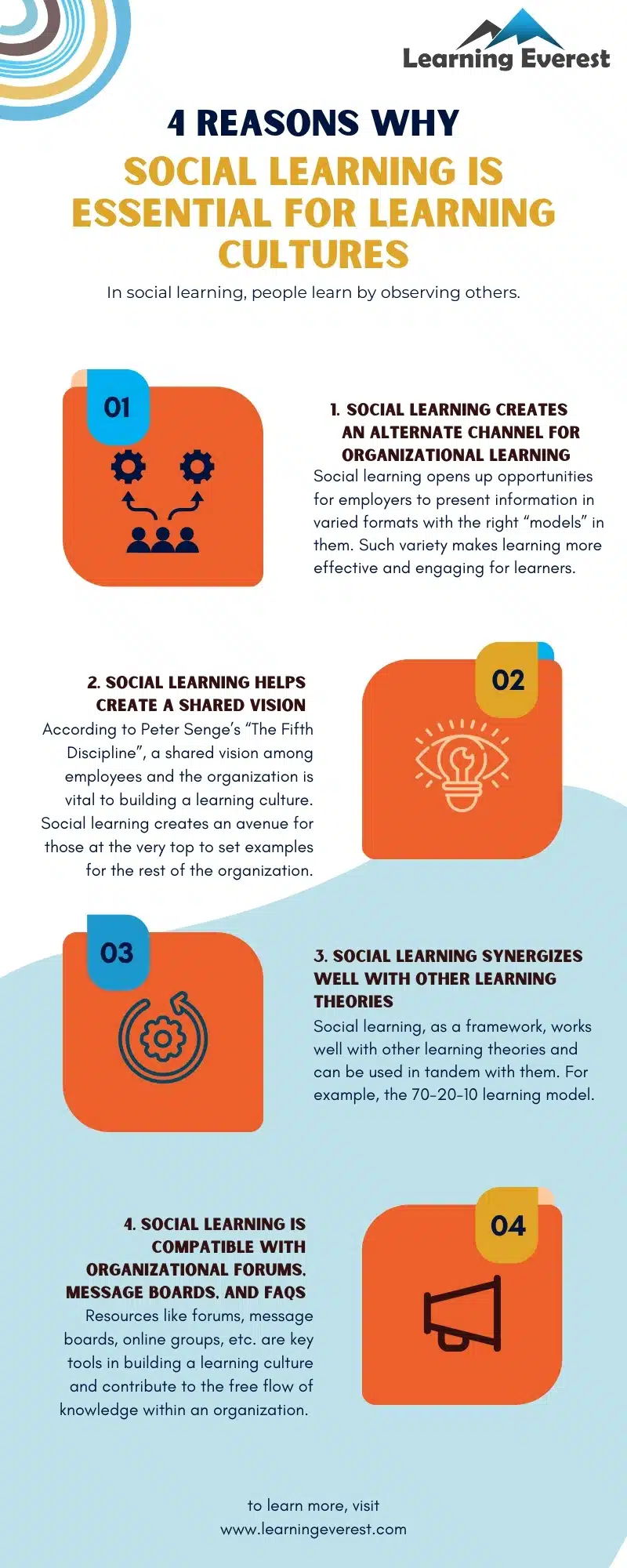When talking about learning cultures, there is often a greater emphasis on individual learning as compared to social learning. However, countless definitions of learning cultures touch upon the social aspect of learning as a key driver of organizational learning. Without shared knowledge and team learning, businesses cannot successfully establish a learning culture since learning in a vacuum only goes so far. In fact, even enterprises without a learning culture heavily rely on collaboration among departments and team members for meeting business targets and overcoming challenges. This article will go over 4 reasons why social learning is vital to an organizational learning culture and should be a mainstay of L&D strategy.
Table of Contents
What is Social Learning?
Before looking at why businesses need social learning, let us quickly go over the meaning of social learning. The social learning theory dates back to the 1960s and was proposed by psychologist Albert Bandura. According to this theory, people don’t always learn through reinforcements and punishments. Instead, learning also happens by merely observing someone else carrying out a behavior. Depending on the behavior’s consequences for the person being observed (i.e., the “model”), the observer infers whether it is a desirable or useful behavior or not. Thus, in social learning, cognitive and behavioral change can occur by observing and interacting with others.
Why Your Organizational Learning Culture Needs Social Learning
Reason 1: Social Learning Creates an Alternate Channel for Organizational Learning
Social learning is not a medium only reserved for face-to-face interactions between people. In fact, in the Bobo Doll Experiment, which is the basis for social learning theory, observational learning took place via videos.
Thus, along with peer interaction, observational learning can also take place through videos, comics, and simulations. Therefore, social learning opens up opportunities for employers to present information in varied formats with the right “models” in them. Such variety makes learning more effective and engaging for learners.
Additionally, given the social component, employees can teach each other valuable skills and mindsets, such as in mentor-mentee arrangements, saving organizations extra L&D costs.
Reason 2: Social Learning Helps Create a Shared Vision
According to Peter Senge’s “The Fifth Discipline”, an essential text for learning organizations, a shared vision among employees and the organization is vital to building a learning culture. If employees are not on board with the organization’s pursuit of continuous learning and development, establishing a learning culture becomes a challenge.
Social learning creates an avenue for those at the very top to set examples for the rest of the organization. When company leaders openly share knowledge, mentor subordinates, and open dialogues for information to flow, employees take note of these behaviors. This motivates them to do the same for each other, thereby building personal knowledge networks throughout the organization. Various such networks strengthen the organization’s learning culture.
Reason 3: Social Learning Synergizes Well with Other Learning Theories
Social learning, as a framework, works well with other learning theories and can be used in tandem with them. For example, the 70-20-10 learning model, which talks of multidimensional learning, emphasizes interactive learning as one of its core pillars. According to this model, 20% of organizational learning should be interactive. What this model refers to as interactive learning is the same as Bandura’s concept of social learning, i.e., learning through experience and interaction with one’s surroundings and the people in it.
Interactive learning advocates for employees to teach each other skills, help out in roles, and build knowledge connections with each other. Thus, social learning can be integrated into larger models to promote learning cultures within an organization, making it flexible and universal.
Reason 4: Social Learning is Compatible with Organizational Forums, Message Boards, and FAQs
Resources like forums, message boards, online groups, etc. are key tools in building a learning culture and contribute to the free flow of knowledge within an organization. If your employees trust that they can learn from each other, such community resources will be used more often. Community resources can only grow if the community participates. Thus, a tradition of social learning among peers will also make them more likely to ask each other for help digitally, building a trove of valuable expert knowledge about common organizational challenges.
Furthermore, businesses can combine some of the most common problem areas into FAQs and microlearning modules for just-in-time access. In addition, these resources are highly valuable onboarding training materials and can contribute to faster and smoother onboarding periods for new hires.
Infographics

4 Reasons Why Social Learning is Essential for Learning Cultures Infographics
Conclusion
Social learning is an essential part of organizational learning cultures as it facilitates knowledge sharing among employees. Through social learning, businesses can save time and money on training, create a strong community of learners, and build highly relevant resources for common employee challenges. Social learning theory also blends well with other learning models such as 70-20-10 model, making it flexible and adaptable. This post of HBR could be a good read.





